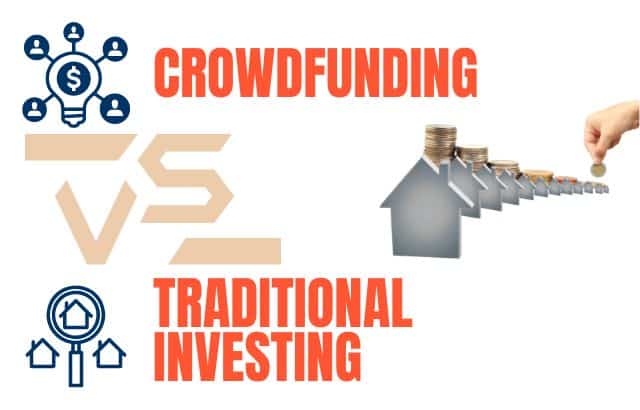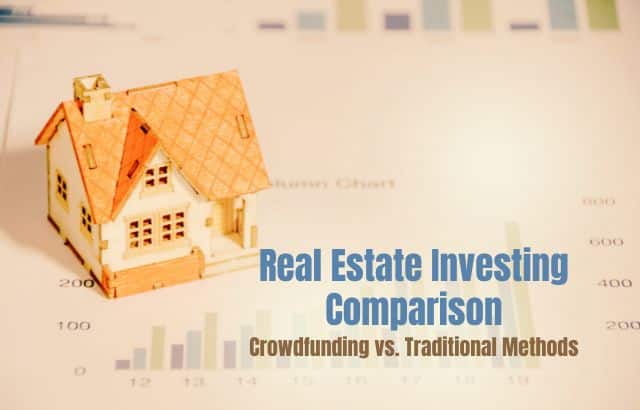Real Estate Investing Comparison – Real estate crowdfunding has emerged as a popular investment option, allowing investors to pool their money together to invest in various real estate projects. This modern approach offers an alternative to traditional real estate investing. In this article, we’ll compare these two investment methods, highlighting their benefits and drawbacks to help you decide which might be right for you.
Table of Contents
What is Real Estate Crowdfunding?

Real estate crowdfunding involves multiple investors contributing smaller amounts of money to fund real estate projects through online platforms. This model enables investors to participate in a range of projects—from residential properties to large commercial developments—without needing substantial capital. By investing in these projects, participants earn a share of the profits proportional to their investment. This method provides a more accessible way to invest in real estate and diversify your portfolio with lower financial commitment.
Example: Imagine you want to invest in a new apartment complex being built in your city. Through a crowdfunding platform, you can invest a few thousand dollars, alongside other investors, to help fund the project. As the complex is completed and rented out, you receive a portion of the rental income based on your investment share.
How Does Traditional Real Estate Investing Work?

Traditional real estate investing involves buying property outright, with the intention of renting it out or selling it for a profit. This method generally requires a large upfront investment and significant personal involvement. Investors are responsible for managing the property, including tenant relations, maintenance, and repairs. While traditional investing can be lucrative, it demands more time, effort, and financial resources.
Example: You purchase a single-family home, renovate it, and rent it out. Over time, you manage the property, handle tenant issues, and take care of repairs. The rental income and eventual sale of the property could yield significant returns.
Pros and Cons of Real Estate Crowdfunding
Pros:
- Accessibility: Allows smaller investments and is easier to get started with minimal capital.
- Diversification: Enables you to spread your investments across multiple properties and projects.
- Transparency: Provides detailed information about investment opportunities and project progress.
- Lower Fees: Often involves lower fees compared to traditional methods.
Cons:
- Limited Control: You have less say in property management decisions.
- Risk: Potential for platform-related issues and less control over the investment.
- Liquidity: Some platforms might have restrictions on how easily you can exit the investment.
Pros and Cons of Traditional Real Estate Investing
Pros:
- Control: You have full control over property management and investment decisions.
- Potential for High Returns: Direct ownership can offer significant appreciation and rental income.
- Tangible Asset: Directly own and manage the property, which can be a tangible asset.
Cons:
- High Capital Requirement: Requires substantial initial investment.
- Time-Consuming: Involves managing the property, handling repairs, and dealing with tenants.
- Complexity: More complex with higher ongoing costs and responsibilities.
Real Estate Crowdfunding vs. Traditional Investing: Key Comparisons
- Accessibility
- Crowdfunding: Lower minimum investment amounts and easier entry.
- Traditional: Requires a larger upfront investment and more financial commitment.
- Diversification
- Crowdfunding: Invest in multiple properties with smaller amounts of money.
- Traditional: Often involves investing in a single property, which can be risky.
- Transparency
- Crowdfunding: Platforms provide detailed investment information.
- Traditional: Less information might be available, with more opacity in some deals.
- Risk
- Crowdfunding: Some platforms offer risk mitigation strategies, but risks still exist.
- Traditional: Risks related to property management and market fluctuations.
- Liquidity
- Crowdfunding: Typically more liquid, with options to exit investments more easily.
- Traditional: Long-term commitment with less flexibility to sell.
- Fees
- Crowdfunding: Generally lower fees due to reduced overhead.
- Traditional: Higher fees, including property management and real estate agent commissions.
- Control
- Crowdfunding: Less control over investment decisions.
- Traditional: Full control over property and management decisions.
Which Option is Right for You?

Hirav Shah, a noted real estate consultant, suggests that your choice between real estate crowdfunding and traditional investing should align with your financial goals and personal preferences. If you have substantial capital and are prepared for a hands-on approach, traditional real estate might be more suitable. Conversely, if you prefer a more accessible and hands-off investment with less initial capital, real estate crowdfunding could be a better fit. Conduct thorough research and evaluate your options to make the best decision for your investment strategy.
Case Examples

Example 1: Traditional Investing
Investor Profile: John, a seasoned real estate investor with a background in property management.
Investment: John purchases a single-family home for $300,000, using a combination of savings and a mortgage.
Management: He handles all aspects of the property, including tenant acquisition, rent collection, and maintenance.
Returns: After one year, John rents the property for $2,200 per month, yielding an annual income of $26,400. After expenses (mortgage, maintenance, property taxes), he nets approximately $15,000.
Challenges: John faces challenges such as dealing with difficult tenants, unexpected maintenance costs, and the stress of property management.
Example 2: Real Estate Crowdfunding
Investor Profile: Sarah, a new investor interested in diversifying her portfolio but with limited capital and experience.
Investment: Sarah invests $5,000 in a crowdfunding project on a platform that funds a $1 million mixed-use development.
Management: The crowdfunding platform manages the project, from acquisition to construction to leasing.
Returns: After a two-year development period, Sarah receives a return of 8% per annum on her investment, totaling $800. Additionally, she benefits from the appreciation of her share of the property.
Challenges: Sarah faces the risk of the project underperforming or delays in completion. She also has limited control over decisions made by the platform.
Comparative Analysis
| Aspect | Traditional Investing | Real Estate Crowdfunding |
|---|---|---|
| Capital Requirements | High (typically hundreds of thousands) | Low (as little as $500 to $10,000) |
| Control | High (direct management and decisions) | Low (dependent on platform management) |
| Risk Exposure | High (market fluctuations, property issues) | Moderate (diversified investments) |
| Liquidity | Low (difficult to sell properties quickly) | Moderate (some platforms offer secondary markets) |
| Investment Horizon | Long-term (typically years) | Varies (shorter projects may be available) |
| Fees | Potentially high (brokerage, management) | Generally lower fees, but varies by platform |
| Diversification | Limited (often concentrated in a few assets) | High (invest in multiple projects) |
Frequently Asked Questions about real estate crowdfunding
– by Hirav Shah

What is real estate crowdfunding?
Answer: Real estate crowdfunding allows multiple investors to pool their money to invest in real estate projects through online platforms, offering a way to invest with smaller amounts of capital.
How does traditional real estate investing differ?
Answer: Traditional real estate investing involves buying property directly, requiring significant capital and active management, but provides greater control and potential for higher returns.
What are the benefits of real estate crowdfunding?
Answer: Benefits include lower capital requirements, easier access to various projects, and enhanced diversification of investments.
What are the drawbacks of real estate crowdfunding?
Answer: Drawbacks include reduced control over investments, potential platform risks, and sometimes lower returns compared to direct property ownership.
What are the advantages of traditional real estate investing?
Answer: Advantages include full control over property decisions, potential for significant rental income, and direct ownership of tangible assets.
What challenges are associated with traditional real estate investing?
Answer: Challenges include needing substantial upfront capital, managing property maintenance and tenant issues, and dealing with complex property management tasks.
Conclusion
Both traditional real estate investing and crowdfunding offer unique opportunities and challenges. Traditional investing suits those with experience, capital, and a desire for control, while crowdfunding appeals to newer investors seeking diversification with lower capital commitment.
Investors should carefully consider their financial goals, risk tolerance, and time commitment when deciding which method to pursue. As the market continues to evolve, understanding these differences will empower investors to make informed decisions in their real estate journey.










